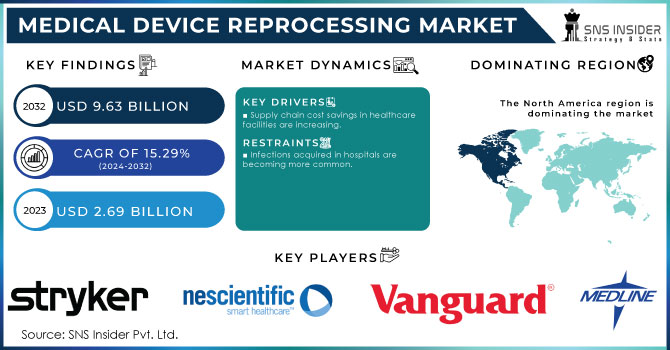Medical Device Reprocessing Market 2024 Size, Share, Global Analysis and Future Trends by 2032
Medical Device Reprocessing Market 2024 Size, Share, Global Analysis and Future Trends by 2032
|
The global Medical Device Reprocessing Market Revenue is set to experience significant growth, driven by increasing demand for affordable healthcare solutions and sustainable practices in the medical sector. According to SNS Insider's latest report, the market is expected to expand at an impressive rate over the coming years due to a combination of cost savings, regulatory support, and technological advancements in reprocessing procedures. With the surge in chronic diseases, demand for healthcare services, and cost-containment pressures, the reprocessing of single-use devices (SUDs) has gained substantial traction among healthcare providers. The reprocessing of medical devices, particularly single-use devices, involves sterilizing, disinfecting, and refurbishing used items so they can be safely reused. This process offers healthcare facilities a cost-effective alternative to buying new devices while also reducing medical waste, a crucial step towards eco-friendly healthcare practices. In recent years, regulatory bodies like the FDA and the European Union’s MDR have established stringent guidelines for reprocessed devices, ensuring the highest safety and quality standards are met. These regulatory measures have helped to bolster the credibility and adoption of medical device reprocessing among healthcare providers globally. Increasing awareness about environmental sustainability in the healthcare sector is another major faactor propelling market growth. Reprocessing medical devices helps significantly reduce the environmental burden by minimizing the volume of medical waste that ends up in landfills. This aligns with broader healthcare industry goals of achieving sustainability, cutting operational costs, and delivering high-quality patient care. With these advantages, the demand for reprocessed devices is expected to grow exponentially in the coming years. Technological Advancements Driving GrowthAs the demand for reprocessed medical devices continues to surge, companies are investing heavily in research and development to improve reprocessing technologies. Innovative sterilization techniques, enhanced materials, and advanced quality control processes have made reprocessed devices safer, more efficient, and more appealing to healthcare providers. Technologies such as low-temperature plasma sterilization, ethylene oxide sterilization, and automated reprocessing systems have revolutionized the field by improving the quality and lifespan of reprocessed devices. With these technological advancements, reprocessing companies can cater to a wider range of devices, from surgical instruments to diagnostic tools, broadening the application scope and enhancing market penetration. In addition, companies are working closely with regulatory bodies to ensure compliance with global standards, facilitating the adoption of reprocessed devices worldwide. Rising Demand from Emerging MarketsThe medical device reprocessing market is witnessing particularly strong growth in emerging economies, where healthcare systems often face budget constraints and rising patient demand. By adopting reprocessed medical devices, healthcare providers in these regions can improve access to high-quality medical tools and technologies without incurring substantial costs. Governments and healthcare organizations are increasingly recognizing the benefits of reprocessing, which not only cuts down expenses but also supports sustainable healthcare practices. This trend is expected to play a pivotal role in expanding the market's footprint across Asia-Pacific, Latin America, and other emerging regions. Key Market PlayersSome of the major players in the medical device reprocessing market include Stryker Corporation, Johnson & Johnson, Medline ReNewal, Vanguard AG, and SureTek Medical. These companies are focusing on strategic initiatives like partnerships, mergers, acquisitions, and product innovation to strengthen their market positions. For instance, companies are launching programs and services tailored to specific healthcare settings, which has improved the availability and reliability of reprocessed devices. With the growing focus on environmental sustainability, cost-efficiency, and technological advancement, the medical device reprocessing market is set for remarkable growth. Both established and emerging players in the industry are poised to benefit as healthcare providers increasingly turn to reprocessing as a viable solution to meet cost and sustainability goals. Challenges and OpportunitiesDespite the robust growth potential, the medical device reprocessing market faces certain challenges. These include concerns about the safety and reliability of reprocessed devices, particularly among patients and healthcare providers unfamiliar with the rigorous reprocessing standards. However, increased regulatory oversight and strict quality control measures have helped alleviate these concerns, boosting confidence in reprocessed devices. The market also presents new opportunities for companies specializing in innovative reprocessing technologies and solutions. As healthcare providers prioritize sustainable and cost-effective solutions, the demand for advanced reprocessing methods is expected to open avenues for further growth and innovation in this sector. Future OutlookAs healthcare systems worldwide adapt to the challenges of rising costs and environmental impact, medical device reprocessing is positioned as a key component of the industry's future. The market's trajectory points towards strong growth, driven by heightened environmental awareness, technological progress, and supportive regulations. The medical device reprocessing market is expected to play an increasingly vital role in the global healthcare landscape, helping facilities optimize their resources, reduce waste, and deliver high-quality patient care at reduced costs. With continuous improvements in reprocessing technology and expanding applications across different medical devices, this market is on track to become an integral part of the healthcare industry. As both developed and developing regions recognize the benefits, medical device reprocessing will continue to grow, helping healthcare providers meet patient needs sustainably and cost-effectively. About Us: Contact Us: Mayur Pande |
| Free forum by Nabble | Edit this page |


